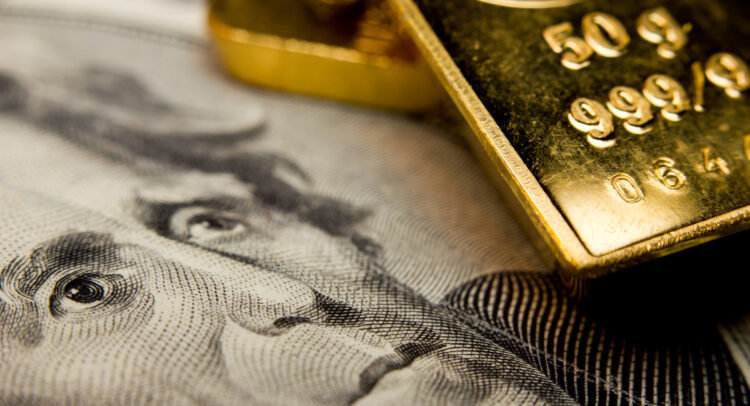Gold keeps driving higher. This week, prices surged to new heights, fueled by expectations of U.S. interest rate cuts, a weakening dollar, and related global issues. On Tuesday, the precious metal saw a 1.6% increase, with the August gold contract climbing to $2,468.84 an ounce. Its previous record was $2,438.50 on May 20. Let’s examine the local and global forces that can push gold to an even higher peak.
Claim 50% Off TipRanks Premium
- Unlock hedge fund-level data and powerful investing tools for smarter, sharper decisions
- Stay ahead of the market with the latest news and analysis and maximize your portfolio's potential
Prospect of Lower Rates Fuel Gold’s Appeal
The Federal Reserve’s softening stance on interest rates has been a key factor in gold’s resurgence. As the central bank signals that a rate cut may be on the cards, the appeal of interest-rate investments diminishes, and more safe-haven investors have moved to gold (CM:XAUUSD). This is due to the inverse relationship between interest rates and gold prices; when rates are low, the opportunity cost of holding gold decreases, making it a more attractive option for investors.
Dollar Weakens, Boosts Foreign Demand
Over the past several weeks, a slowly weakening dollar (DXY) has also contributed to gold’s rise. A lower dollar makes gold more affordable for foreign buyers, increasing demand and prices. Additionally, the decline in U.S. Treasury yields and the expectation that the direction will continue are bearish for the dollar, which, as mentioned, creates opportunities for foreign buyers.
Political Uncertainty Fuels Gold Buying
Gold’s recent surge has been supported by political uncertainty. As gold was breaking a record high on Tuesday, the French government led by Prime Minister Gabriel Attal resigned following an inconclusive election result that left the country without a clear majority. Meanwhile, in the U.S., there is some uncertainty about who the candidate will be in one major party, and the other major party candidate narrowly escaped an attempt on his life last week. These perplexing political problems will not fade in the near future, a climate that points toward the continuing trend of buying gold.
Central Bank’s Relentless Appetite for Gold
Central bank purchases have further bolstered the demand for gold. According to the World Gold Council, global official gold reserves increased by 290 metric tons in the first quarter of this year, the largest first-quarter increase since at least 2000 and 69% higher than the five-year quarterly average.
Possible Downside
Despite these positive factors, some caution remains. If the Fed remains prudent and wants more supportive data before cutting rates, gold prices may have a short-term negative impact. However, most factors that drive up gold prices remain unchanged over the medium to long term.
Key Takeaways
Gold prices have surged to new heights, driven by a combination of factors. First, expectations of U.S. interest rate cuts have played a significant role in the rally. Secondly, the weakness in the dollar has also been a key driver, making gold more affordable for foreign buyers and increasing demand. Furthermore, political uncertainty, including the recent assassination attempt on former President Donald Trump, has added to the rise in gold prices. Additionally, central bank purchases have further bolstered demand for the precious metal. Despite some caution, the medium to long-term outlook for gold remains positive.
















